 Petzlover
Petzlover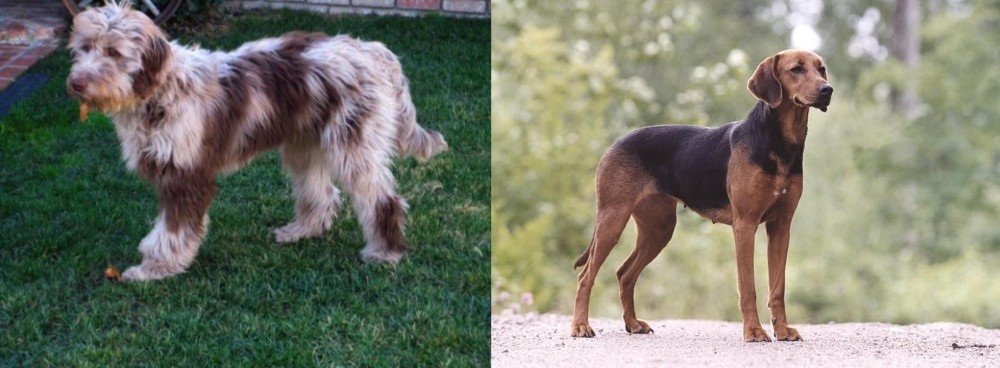 Aussie Doodles is originated from United States but Schillerstovare is originated from Sweden. Aussie Doodles may grow 11 cm / 4 inches shorter than Schillerstovare. Aussie Doodles may weigh 6 kg / 14 pounds more than Schillerstovare. Aussie Doodles may live 3 years less than Schillerstovare. Both Aussie Doodles and Schillerstovare has almost same litter size. Aussie Doodles requires Moderate Maintenance. But Schillerstovare requires Low Maintenance
Aussie Doodles is originated from United States but Schillerstovare is originated from Sweden. Aussie Doodles may grow 11 cm / 4 inches shorter than Schillerstovare. Aussie Doodles may weigh 6 kg / 14 pounds more than Schillerstovare. Aussie Doodles may live 3 years less than Schillerstovare. Both Aussie Doodles and Schillerstovare has almost same litter size. Aussie Doodles requires Moderate Maintenance. But Schillerstovare requires Low Maintenance
 It is interesting to note that the Australian Shepherd doesn’t have much in common with the land ‘down under’. The dog has always been a popular companion dog in the United States as a working dog. As a hybrid, the Aussiedoodle is a new breed that doesn’t have a detailed history, but it is worth taking not that the 2 breeds that have been used to create the Aussiedoodle do have long histories each.
It is interesting to note that the Australian Shepherd doesn’t have much in common with the land ‘down under’. The dog has always been a popular companion dog in the United States as a working dog. As a hybrid, the Aussiedoodle is a new breed that doesn’t have a detailed history, but it is worth taking not that the 2 breeds that have been used to create the Aussiedoodle do have long histories each.
It is believed that the name of the Australian Shepherd is because the ancestors of the dog arrived from Australia in the United States and were named from where their ancestors previously resided. The Aussiedoodle has only emerged on the scene in the last 10 years and is becoming hugely popular. The breed isn’t recognized by the American Kennel Club but are recognized by the American Canine Hybrid Club.
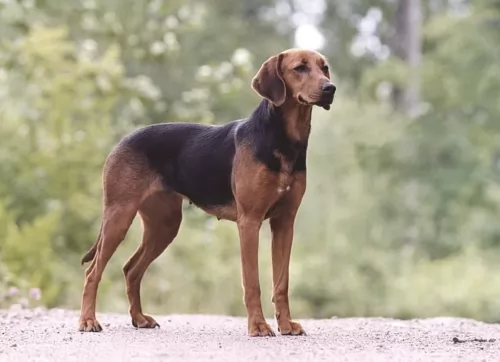 The Schillerstövare originated in Sweden, being named after a Swedish farmer, Per Schiller. After he died, the dog was named Schillerstövare in 1907, and was Sweden's first native dog breed.
The Schillerstövare originated in Sweden, being named after a Swedish farmer, Per Schiller. After he died, the dog was named Schillerstövare in 1907, and was Sweden's first native dog breed.
The Swedish Kennel Club recognised this dog in 1907 and it is also recognised by the Federation Cynologique Internationale as well as a number of minor kennels and dog clubs.
The dog has always been used as a hunting dog and the English Foxhound is the e foundation for this breed.
 The Australian Shepherd was bred to herd livestock together, and with the Aussiedoodle, you’ll still sometimes see this trait, and he may well try to herd his human family into the car. The Aussiedoodle can’t always be expected to look the same as they come in many sizes and shades of colour, some leaning more towards the Poodle and others more towards the Australian Shepherd. He is a medium- to large sized dog with a strong-boned, muscular structure.
The Australian Shepherd was bred to herd livestock together, and with the Aussiedoodle, you’ll still sometimes see this trait, and he may well try to herd his human family into the car. The Aussiedoodle can’t always be expected to look the same as they come in many sizes and shades of colour, some leaning more towards the Poodle and others more towards the Australian Shepherd. He is a medium- to large sized dog with a strong-boned, muscular structure.
The coat of the Aussiedoodle can differ somewhat, with most having wavy or curly hair while others have fairly straight hair. The dogs are available in many different colours, from solids to patterned and in shades such as black, grey, silver and blue merles. Size can vary too, depending on whether the Aussiedoodle had a miniature or standard poople involved with the pairing.
The Aussiedoodle is exceptionally clever and also very energetic. This dog breed will require training, socialization and exercise. Training an Aussiedoodle is easy as you will see he is eager to please.
The Aussiedoodle loves his family and this isn’t a dog that can be left outdoors all day on his own. He is lively and energetic, and left too long on his own, he can become bored and destructive. This hybrid makes the perfect pet for families with kids, with no aggressive tendencies. He can also be introduced to other pets in the home as he is a friendly, amicable breed who wants to please.
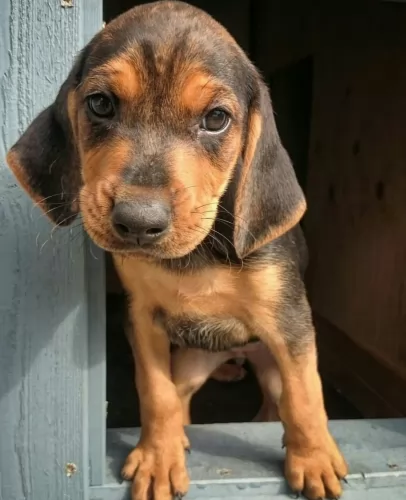 The Schillerstövare is a medium to large sized dog. They’re athletic and muscular.
The Schillerstövare is a medium to large sized dog. They’re athletic and muscular.
Standing at between 53–61cm in height and weighing in the region of 18–25kg, the coat of the dog is fairly short and harsh, with the color being black and tan.Sometimes you’ll see some white markings on the chest and paws.
The head is domed, the eyes brown, bright and alert and the ears of the dog are broad, medium length and floppy. The long tail is carried low or held out when running or alert.
If you allow your Schillerstovare to have puppies, you can expect between 3 to 7.
The Schillerstovare is a calm dog but he can get petty lively when there’s a game to be had. He gets on well with well disciplined children who have been taught to be kind and respectful to animals. He also gets on well with pets in the home. Just like with most other dogs, he will need to be trained and socialized as he is a strong willed, confident, dominant dog.
He is friendly and active but will be somewhat reserved around strangers.These dogs will require a lot of exercise and will need quite a bit of space too. They aren't well suited to small properties in the city. He will need a daily walk but also a chance to get off his leash and run free in the park. Other forms of exercise such as hikes, ball game and swimming will delight him.
 The Aussiedoodle is an intelligent, outgoing, patient and devoted family pet who will happily slot into any home where there are children and other pets.
The Aussiedoodle is an intelligent, outgoing, patient and devoted family pet who will happily slot into any home where there are children and other pets.
Most Aussiedoodles love being active and you’ll want to include him in all your activities – walking, swimming, ball games and herding.
Yes, it is true that the temperament of your Aussiedoodle will depend on the canine parents but he will also be influenced by your lifestyle and environment too.
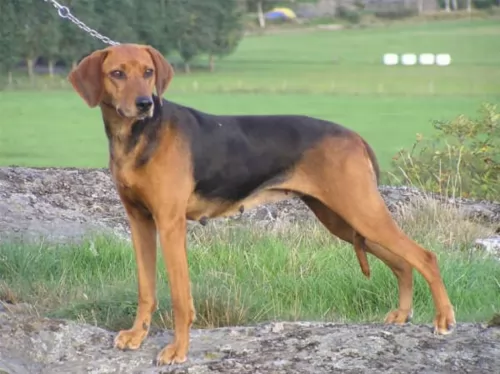 Schillerstovares are social, loving, friendly, loyal dogs who enjoy being around their human family. He’s going to need a lot of exercise, both mental and physical to keep him from boredom and frustration.
Schillerstovares are social, loving, friendly, loyal dogs who enjoy being around their human family. He’s going to need a lot of exercise, both mental and physical to keep him from boredom and frustration.
He will rely on you for at least a daily walk. He is strong-will and confident and will do well in a family where they are active and where they are firm, patient, kind and consistent in their behaviour towards him because then he ticks all th right boxes for being a splendid pet.
 As with most mixed-breeds, Aussiedoodles are a healthy breed, and your pet won’t come with any hereditary ailments. Both Australian Shepherds and Poodles have few inherent diseases, and by mixing the two, you get a robust breed.
As with most mixed-breeds, Aussiedoodles are a healthy breed, and your pet won’t come with any hereditary ailments. Both Australian Shepherds and Poodles have few inherent diseases, and by mixing the two, you get a robust breed.
Having said that, you always have to be aware that any dog, including your Aussiedoodle can inherit certain health problems of both the Poodle and the Australian Shepherd.
The Australian Shepherd is susceptible to vision problems and some health problems with the Poodle include epilepsy, renal disease and cancer, but in spit of this, the good news is that there aren’t many documented health issues with Aussiedoodles.
Always research and find a reputable breeder of Aussiedoodles who has certificates that the parents are sound and free from common health defects. Make sure that you get your puppy vaccinated from 8 weeks of age to avoid the common, deadly canine diseases that can rob you of your puppy. The very first vaccination will be for distemper, measles and parainfluenza.
 Even though your Schillerstovare is a healthy dog breed, hip dysplasia is a common dog disease that many dogs get.
Even though your Schillerstovare is a healthy dog breed, hip dysplasia is a common dog disease that many dogs get.
This is a skeletal disease when a dog’s hip joints become partially dislocated. It can be very difficult for your dog to get around, and he can also develop arthritis. It gets very sad when your dog doesn’t even want to participate in games anymore.
 The coat of Aussiedoodles need minimal maintenance. This is because of the Poodle input which is a low shedding dog. Aussiedoodles shed very little, but you will still need to give your dog a regular brush every other day to remove loose hairs and to also prevent matting. You can even include some professional grooming as his thick coat can quickly look dirty and unruly.
The coat of Aussiedoodles need minimal maintenance. This is because of the Poodle input which is a low shedding dog. Aussiedoodles shed very little, but you will still need to give your dog a regular brush every other day to remove loose hairs and to also prevent matting. You can even include some professional grooming as his thick coat can quickly look dirty and unruly.
Brush the teeth of your Aussiedoodle with special dog brushes and toothpaste to prevent plaque forming. You can also book an appointment at your local vet to have his teeth cleaned if you are reluctant to do it. it.
An Ausiedoodle under 6 months of age should be fed 3 or 4 times daily. Once your Aussiedoodle is 1 year of age you can cut the meals down to 1 or 2 meals a day.
Always select high quality foods and understand the labels and ingredients. Cheaper foods with ‘bad’ ingredients can mean more medical bills because of malnutrition.
Speak to your vet about feeding your Aussiedoodle. You can also prepare cooked meals for your dog and include chicken, meat, rice and vegetables. Remember this is a high energy dog and he will require foods high in protein to meat his daily energy and nutritional requirements.
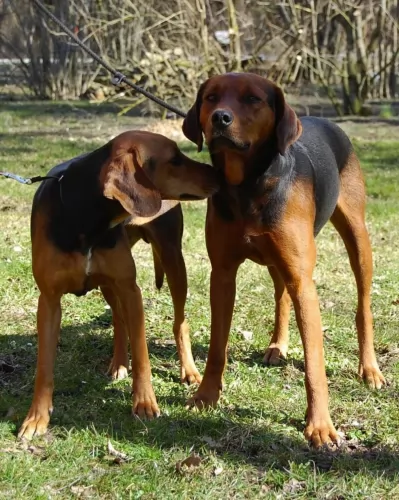 With his short coat, the Schillerstovare is considered a low maintenance dog and requires a minimal amount of grooming. Brushing should be done twice a week to remove loose hair. The harsh outer coat seems to repel dirt and dust.
With his short coat, the Schillerstovare is considered a low maintenance dog and requires a minimal amount of grooming. Brushing should be done twice a week to remove loose hair. The harsh outer coat seems to repel dirt and dust.
Trim your pet’s nails, check inside his ears for signs of redness, make sure his eyes are bright and clear and make sure he doesn’t have any unusual lumps on him.
Make sure his vaccines are up to date to avoid deadly canine diseases. Take him to the vet when you suspect he isn’t his normal self.
Dogs, just like humans, do well on good, nutritious diets. Feed a human lots of junk food and sweets and they’ll grow up to be obese and unhealthy. That's exactly how it is with dogs too. Some of the best commercially manufactured dog foods are convenient and they can be good if you look at the top brands. Look for ones that cater for your dog’s age, size, breed and activity levels. This dry kibble can be made more inviting for your pet when you include some homemade food.
Dogs just want simplicity so that they don’t battle with digestive problems. Boiled chicken, sweet potatoes, brown rice or pasta, carrots and spinach will be wonderful for him when you chop the food up and add it into the dry kibble twice a week. See his tail wag and his brown eyes light up when he smells this treat. Some raw meat added up occasionally will also contribute to your pet’s heath.
Make sure he is never without a constant supply of fresh, cool water.